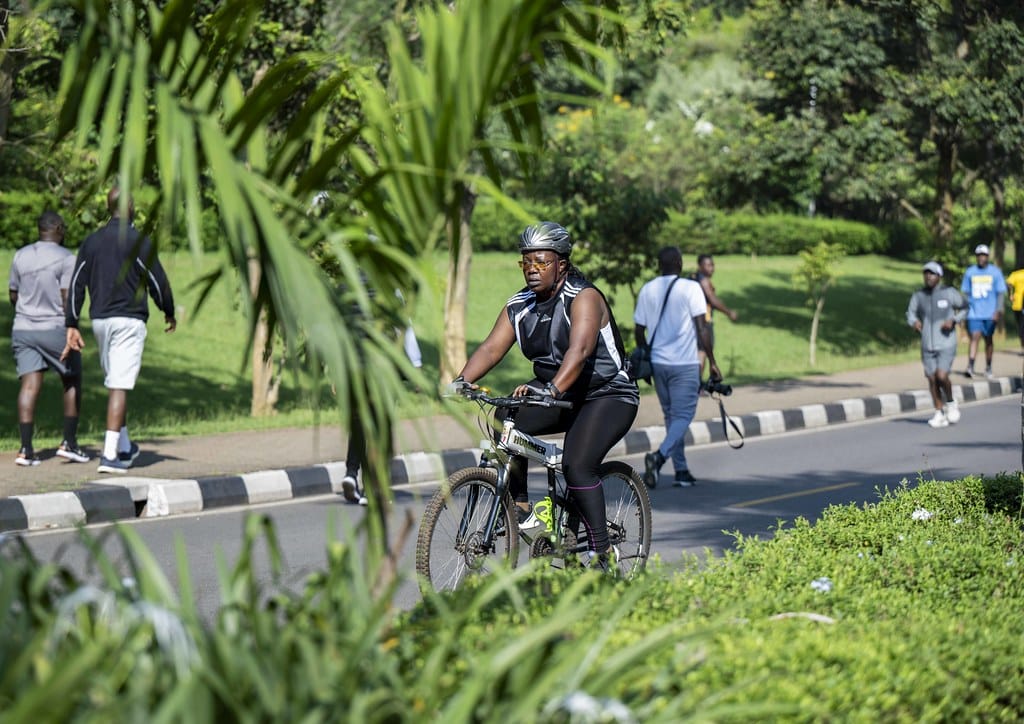
Urban transport is one of Africa’s most pressing challenges, with rapid urbanisation, rising motorisation, and traffic congestion threatening the quality of life and sustainability of cities. Addressing these challenges is not just a matter of convenience. It is a necessity for public health, economic growth, and climate resilience. Africa’s cities must prioritise sustainable mobility to meet global emissions targets, reduce air pollution, and improve urban living standards. But achieving this requires innovative, locally relevant solutions, and that is exactly what the regional exchange session at the Transport and Climate Change Week 2024 demonstrated.
Country representatives from Cameroon, Cape Verde, Kenya, Morocco, Senegal and Tanzania presented concrete and replicable initiatives that have been developed and successfully implemented within their national contexts. Each pitch followed a structured approach, showcasing specific examples that offered participants tangible insights and inspiration for their own projects.
Jean-Marie Vianney Ntamwiza, Green Mobility Specialist for the City of Kigali, highlighted Kigali’s car-free day initiative, which takes place on the first and third Sundays of every month. The initiative designates certain car-free zones that encourage non-motorized transport (NMT), redefining how urban spaces can prioritise people over vehicles. Participation over the last years has steadily increased, and the introduction of electric bicycles is further reducing traffic congestion and emissions. One of the main factors in the success of this initiative is the development of supporting infrastructure, including 220 kilometres of cycle paths and pedestrian walkways, which greatly encourage sustainable mobility.
In Tanzania, Mr. Hamisi Maulid, Green Infrastructure Advisor at GIZ, presented on the SGR project which is revolutionising regional transport by replacing outdated diesel locomotives with electric-powered trains. Spearheaded by the Tanzania Railways Corporation, the project aims to position Tanzania as a regional transport hub while slashing carbon emissions. This SGR is a big step forward for electrified rail transport in East Africa and a model for aligning infrastructure development with sustainability goals.
Mr. Rito Evora, Director at the National Directorate of Industry, Trade and Energy, presented Cape Verde’s Electric Mobility Charter, a framework launched in 2017 to facilitate the country’s transition to electric vehicles. The initiative includes a series of incentives to encourage the uptake of EVs, with the aim of achieving a fully electrified fleet by 2050. The country benefits from an e-mobility project funded by the Mitigation Action Facility. As part of this project, several applications for EV rebates have been approved and public charging stations are being built to support this transition.
Mr. Patrick Diame Dione, Interface Engineer for CETUD, provided an update on the electric BRT project in Dakar, which is funded jointly by the World Bank and the Senegalese government. The BRT system incorporates solar energy autonomy and integrates various transport modes to provide a seamless, sustainable transport network. With a long-term vision for sustainable urban mobility by 2040, the project is designed to reduce congestion, enhance public transport efficiency, and lower environmental impacts, marking a significant step toward transforming urban mobility in Senegal’s capital.
Dr. Jean-Patrick Mfoulou, Head of Unit – Public Transport and Active Mobility at the City of Yaoundé, introduced Cameroon’s Sustainable Urban Mobility Plan for Yaoundé, focusing on the challenges the city faces in improving transportation and the strategies being employed to address them. The plan outlines key actions to enhance the urban transport system, improve traffic management, promote clean mobility, and make the city more pedestrian-friendly, with an emphasis on long-term sustainability. The MoVe Yaoundé project, as part of the Team Europe initiative, will support the implementation of better infrastructure, policy interventions and public awareness campaigns to encourage the adoption of greener transport options.
In Morocco, the approach to sustainable urban transport takes on a unique dimension. Mr. Benboukhris Abdelilah, Mission Manager at the Fund for Urban and Interurban Road Transport Reform (FART), shared insights into how his unit is driving transformation. FART focuses on promoting and financing modern, climate-friendly public transport services across Moroccan towns and cities. Notable achievements include subsidising the introduction of low-emission buses and supporting the establishment of integrated public transport systems in major cities such as Casablanca and Rabat. He highlighted that beyond infrastructure financing, FART offers capacity building and technical assistance to ensure that local stakeholders can effectively manage and sustain their transport systems.
In summary, the session emphasised that Africa has the knowledge, tools, and capacity to address its urban transport challenges through innovative and locally adapted solutions. Scaling these initiatives is critical to building more sustainable, efficient, and inclusive transport networks across the continent. Participants left with more than ideas; they gained actionable insights, tangible examples, and a renewed commitment to championing sustainable urban transport in their own cities.
Rethinking Transport is a GIZ self-financed initiative, implemented by GIZ and Agora Verkehrswende.
 Car Free Day Kigali by Paul Kagame, Source: FLICKR
Car Free Day Kigali by Paul Kagame, Source: FLICKR

Ulrich Tokam
ulrich.tokam@giz.de
Visit profile